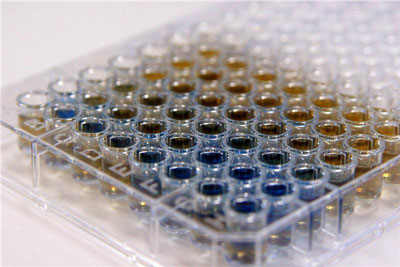| Nov 07, 2012 |
Synthetic biofilter removes estrogens from drinking water
|
|
(Nanowerk News) Months of painstaking work in the laboratory at Bielefeld University‘s Center for Biotechnology (CeBiTec) have paid off: the 15 students participating in this year’s ‘international Genetically Engineered Machine competition’ (iGEM) at the Massachusetts Institute of Technology (MIT) have good reason to celebrate. The goal of their project was to develop a biological filter that removes estrogen from drinking water. It was a success: they managed to produce enzymes that break down the hormone. On Monday 5 November, the competition finals came to a close in Boston. From 190 teams throughout the world, Bielefeld’s students made it through to the ‘Sweet Sixteen’, the selection of the 16 best teams in the company of teams from such prestigious universities as Stanford University (USA), the Canadian University of Calgary, and Jiaotong University in Shanghai, China.
|
 |
| Hundreds of samples were needed to reach success: The synthetic biofilter developed by Bielefeld University’s iGEM team can filter out estrogens from contaminated water.
|
|
More than 70 teams from throughout the world got through to the finals of the top student competition in synthetic biology. The Bielefeld team was one of five German teams at the start. Bielefeld University has now participated in the iGEM competition for the third year running and already succeeded in qualifying for Boston in 2010 and 2011. This year’s team, like its predecessors, made it into the ‘Sweet Sixteen’. ‘We stand in direct comparison with universities like Stanford and Cornell. At first, that seemed very intimidating, but we soon noticed they were having to fight exactly the same problems as we were. And with our know-how, we can match the pace here’, says Moritz Müller, a master student of molecular biotechnology.
|
|
Conventional methods of filtering waste water in sewage treatment plants are unable to completely remove medicine residues such as the estrogens in birth control pills. These residues then find their way into rivers and lakes and also accumulate in our drinking water. For fish and other aquatic life, estrogens can lead to reproductive and developmental disorders and even to the formation of female characteristics in males. The potential long-term consequences for human beings – declining sperm counts, infertility, various cancers, and osteoporosis – are still largely unknown.
|
|
The Bielefeld iGEM team has developed a biological filter in which specific enzymes (so-called laccases) break down these medicine residues. One known source of particularly efficient laccases is the turkey tail, a type of fungus that grows on trees. Using methods from synthetic biology, the students succeeded in synthesizing this enzyme and applying it to filter material. ‘We didn’t want to invent something totally crazy with our project – just because it’s technically feasible. We wanted to do something that could actually be put to use in the near future, perhaps in 20 years, and be a real benefit’, explains Robert Braun, a master student of molecular biotechnology. ‘The biofilter is such a project. And we have shown that our idea works. In principle, a company could now come along and develop our filter further. We ourselves have got to get back to our studies – most of us have rather neglected them for the last 6 months. However, the experiences we have gathered more than compensate for that’.
|

